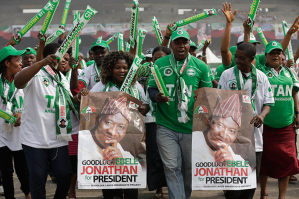
People in Nigeria went to the polls over the weekend to elect a president. Based on the election results, former military dictator Muhammadu Buhari won, and President Goodluck Jonathan has conceded defeat.
According to Adam Nossiter of the New York Times, that election was the most competitive presidential race ever conducted in Nigeria. Buhari held a lead of more than two million votes over the current president.
"We knew that we had the numbers last night, but dealing with the type of government we have, we have never really felt we are out of the woods," Buhari campaign spokesman Garba Shehu, who represents the All Progressives Congress (APC) party, said. "Clearly we have won it. We are going to the party headquarters now and the presidential candidate will declare victory."
Nossiter reported that Nigeria has spent much of its post-colonial history under military coups. If power is handed over peacefully, it would be the first time such an event has taken place among civilians in Nigeria.
According to Tim Cocks and Alexis Akwagyiram of Reuters, Buhari would become the first Nigerian to oust a president through the ballot box. His predecessor, Jonathan and the People's Democratic Party (PDP), had been in charge of the country since 1999; however, both have lost popularity thanks to various corruption scandals and the rise of Boko Haram, a Sunni Muslim extremist group wreaking havoc in the northeastern part of Nigeria.
"At about 5 minutes to 5, President Jonathan called General Muhammadu Buhari, the winner of the elections, to congratulate him," APC spokesman Lai Mohammed told reporters at the party's headquarters in Abuja. "There had always been this fear that he might not want to concede but he will remain a hero for this move. The tension will go down dramatically."
Analysts told the New York Times that the elections could usher in a competitive two-party system in a country that is regularly seen "as a bellwether on the continent."
"It is very significant in our democratic growth, in grounding democracy and consolidating it," Ebere Onwudiwe, a political scientist with the Ken Nnamani Center for Leadership and Development, said. "We can't have a one-party democracy. We're setting a very great example for the rest of the smaller states in Africa."
However, the New York Times reported that Britain and the United States have warned about Nigeria's government influencing the election results. Secretary of State John Kerry and British foreign minister Philip Hammond issued a joint statement about the election.
"So far, we have seen no evidence of systematic manipulation of the process," Kerry and Hammond said. "But there are disturbing indications that the collation process - where the votes are finally counted - may be subject to deliberate political interference."
A spokesman for Jonathan denied any such interference to the New York Times, given that the results were solidly in Buhari's favor. However, Nossiter reported that Nigeria's military has intervened in this election at least once, when they forced the electoral commission to delay the vote for six weeks.






